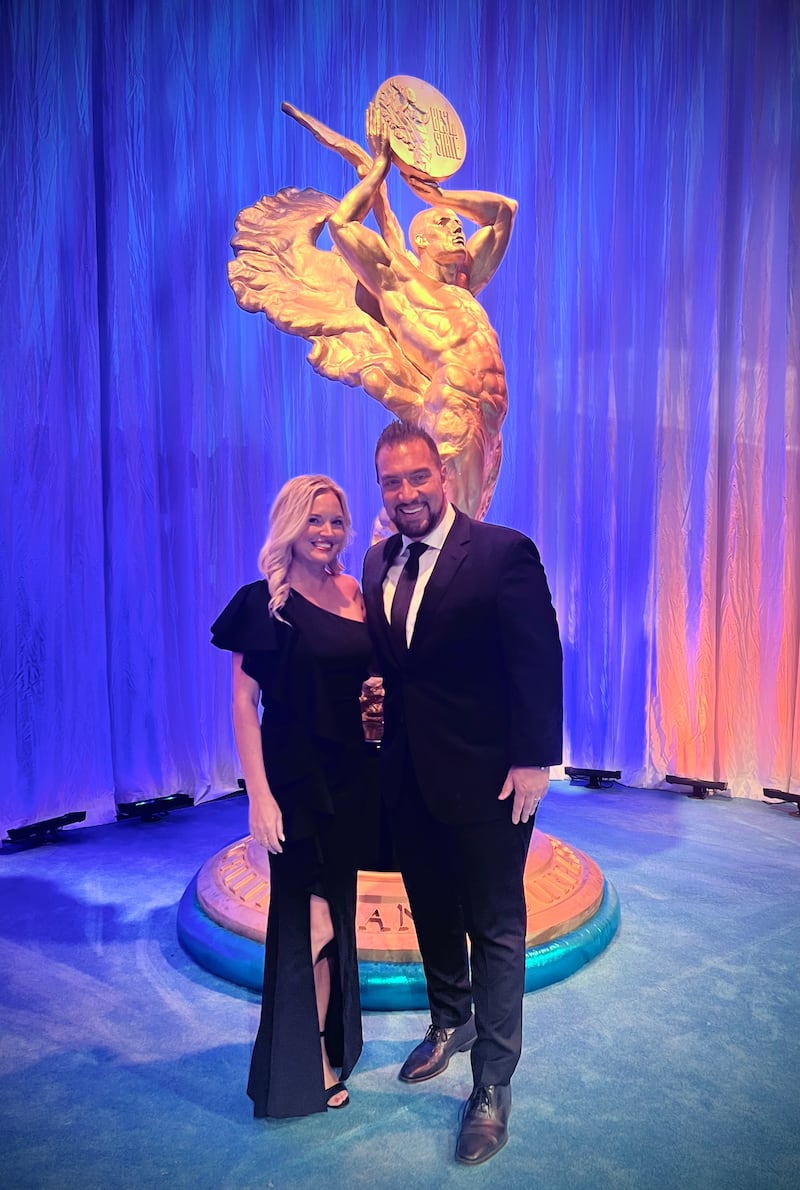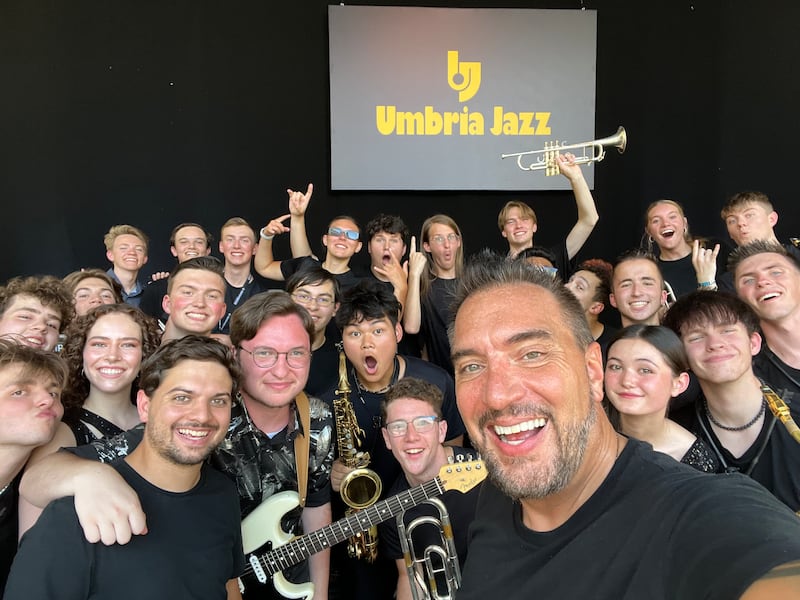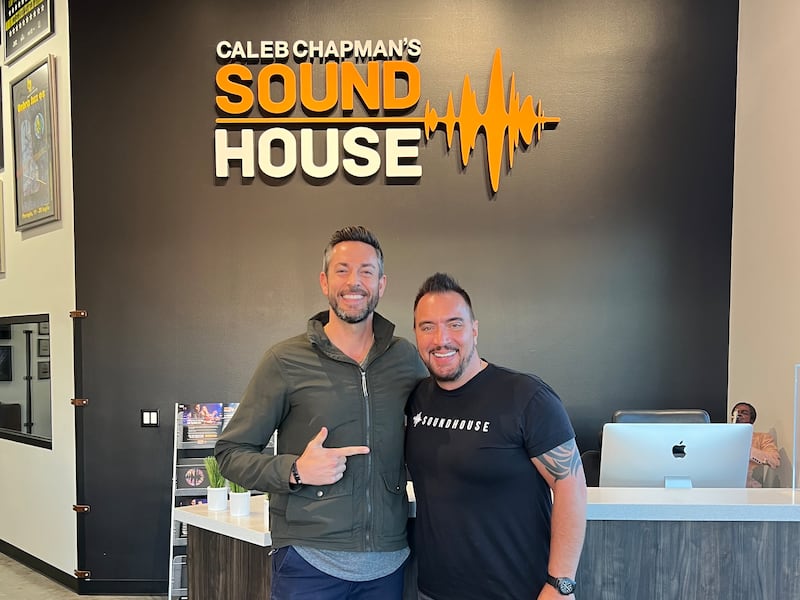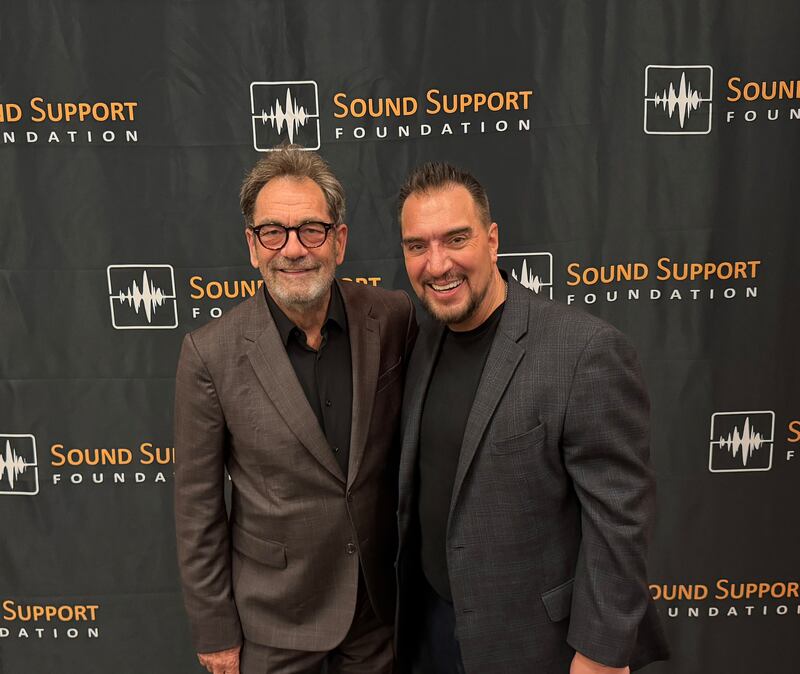It’s just after 3:30 on a Friday afternoon, and 20 students fill a stage with both bodies and sound. A cornucopia of instruments is there with them: drums, saxophones, guitars and more. Stage lights shine. Swaying leads to playing, and strumming invites singing.
The students start playing an enthusiastic take on Huey Lewis & The News’ 1985 hit, “The Power of Love,” and then make their way through a few runs of Billie Eilish’s “No Time To Die,” the 2021 James Bond theme song. The singer behind the microphone wears a tee from Eilish’s “Hit Me Hard and Soft: The Tour,” wearable proof she’s a fan.
It’s just a practice session, but it feels like a concert. That’s by design.
Grammy-nominated Caleb Chapman is 27 years deep into the business of teaching music at Caleb Chapman’s Soundhouse, turning players like this group of students into performers. He’s taught kids aged 10-18 since 1998 in a unique way: choosing to practice and perform as an ensemble. Every child and teenager learns how to get reactions from a crowd, to play alongside peers and to overcome any hint of stage fright.
“[The art of teaching music] seems to have gotten lost as we’ve moved music into academia, but the biggest difference is that most music schools do what they tell you they’re going to do, which is teach music,” Chapman says. “The power of what we do here is that we combine teaching music with teaching performance, coupling those parts together — there is the secret sauce.”

What Chapman does is far more ambitious than a school music program with paint-by-number recitals and lessons. His students perform annually at the Eccles Theater in Salt Lake City and the Lincoln Center for the Performing Arts in New York City, among other accomplishments (like being regularly recognized and awarded by DownBeat).
“I love what music did for me, helping me develop creativity, confidence and life skills in the same way playing sports did. You can learn discipline and teamwork playing basketball or football, and music allows for all of that too,” Chapman says. In fact, according to a 2023 University of Southern California study, music education can contribute to overall well-being and improve cognitive function, creativity, mental health and emotional stability.
“Music is a connection to the soul,” Chapman says. “It’s an expression, a communication, a manifestation of emotion, everything inside an individual.”
That link also serves as a springboard to what Chapman wants to accomplish and provide with his school.
“Music education has real power to it. If I tried to accomplish what I wanted in the traditional music education setting, my hands would always be tied,” Chapman says. “What I wanted to do was so against the grain that nobody would have let me attempt it in a structured organization. It needed to be birthed independently, outside the system.”
Imagining a dragon
For Chapman, music took hold in the fourth grade when he learned to play the saxophone. Over time, he began to enjoy it more and more, lasting into college when he received a full scholarship to study music at Brigham Young University. The more he learned, the more he wanted to pursue music beyond his school years, but options were limited.
Being a performer was out of the question, as he didn’t care for the lifestyle that usually came with it. Teaching music using traditional methods didn’t resonate as a career either, as he felt he would lack the freedom to do so the way he wanted to. Getting a master’s in business would have to do, and he began preparing to go that route.
“And right before I graduated, I had this crazy idea of trying to start a music school,” Chapman says.
Before graduating, Chapman drove around American Fork, Utah, finding a small red brick building available for lease. He decided it looked as good a spot as any for a music school. To his surprise, the person leasing it turned out to be a doctor he’d seen a year previously and who now allowed him to rent the building for $500 a month instead of its initially listed $3000. That price agreed better with his student income at the time.
“This was one day after I had the idea. I didn’t even know if I wanted to do it yet, and now I had a building,” Chapman says. One month later, Caleb Chapman’s Soundhouse opened.
The idea for this company was to start a music training program different from what existed, but that didn’t happen right away. When the school opened, it was not unlike other schools that already existed, offering private music lessons for kids playing various instruments. A few months in, a group of kids asked Chapman if they could put together an after-school jazz band and perform at the Soundhouse. He hesitated.

“I didn’t have my degree yet. As a pop and classical musician, I didn’t feel capable of running a jazz ensemble. Most of my training was as a conductor,” Chapman says. “So I called every expert jazz musician I knew in the state, and either nobody was interested, or they were unavailable.” Still, he was determined not to let the kids down.
“Being a broke, new business owner, I wouldn’t turn down an opportunity. I returned to those kids and said yes to the band with no idea what that would look like,” Chapman says. “Rehearsals started, and I realized I could compensate for my lack of experience by bringing energy to it. Doing so allowed the kids to respond with enthusiasm in their playing, which translated instantly.”
It was performing as a group that changed the entire direction of his business. After putting the first group together, Chapman could see more clearly what he wanted music education to do. Having his students perform together was the vehicle he needed to accomplish the results he felt were possible. The first group formed in 1999.
A drummer from that first group, a seventh grader named Andrew Tolman, also asked if he could put a band together. The junior high student went on to be a founding member of Imagine Dragons. Tolman recalls Chapman visiting the band room and performing saxophone for them when he was still in school. Chapman recruited students to take private music lessons at his Soundhouse, and Tolman signed up for drum lessons on the spot to study under Chapman’s tutelage for several years.
“Caleb brought so much energy into the room and helped us all have fun learning and performing,” Tolman says. “Performing in the ensemble bands created during that time — a salsa band, a jazz band and a funk band — gave me invaluable experience in diverse settings that significantly shaped my music career. I carry those experiences with me as a touring musician today.”
In 2008, the school’s program got an overhaul. Private instruction stopped and everything became ensemble-based, including bands of all genres: rock, pop, ska, Motown, reggae, New Orleans brass, Latin and even Modern Big Band.

“I’m so grateful to those kids who originally came to me to do this group. I knew I wanted to do things differently, but I wasn’t even sure where to start,” Chapman says. “It became the catalyst for what the entire business has become.”
Stephanie Paul of Saratoga Springs is a mother who has benefitted from Chapman’s efforts. After attending a Christmas concert by Chapman and his students in 2023, all three of her children chose to become students at his school. Her two daughters sing regularly as part of his groups while her son plays the trumpet.
“Caleb came out the first time we ever saw him and said, ‘This is a noisy concert not a sit and listen concert. We’re going to have some fun,’” Paul says. “Once they performed, my daughter — who’s been doing theater since she was eight — turned around, grabbed my shoulder and said, ‘I want to do this. Forget tennis. I want to do this.’”
The heart of rock and roll
The Soundhouse earned a famous fan when Chapman invited Huey Lewis to see his students perform hits from Lewis’ catalog. As part of a collaboration, Chapman and Adam Reader (known as the Professor of Rock on YouTube) recently established the People’s Hall of Fame annual awards ceremony to honor great artists who have not received the appropriate recognition. The event also allows students to learn the discography of these unnoticed greats and pay tribute to them, ideally with the person or persons being honored in attendance. Chapman and Reader, moved by the impact of Huey Lewis & The News, chose Lewis as the first musician they honored.
When Lewis learned of the idea of being honored by 200 Soundhouse kids playing music from his band’s catalog, he was touched. Not only would the event give recognition to Lewis, but it would also act as a fundraiser for music scholarships through the Sound Support Foundation. Lewis liked what he heard and committed to attending.
“[Lewis] shared with us that he was unprepared for what he saw. He was very excited, very grateful,” Chapman says. “It was one thing to be able to honor him, but to see an artist of his stature see these young people crushing his band’s music and being so passionate about it, that has to be a powerful thing for him — to feel that his music has a legacy, a timeless quality.”

Lewis’ ongoing health problems prevent him from being able to play or often hear music, but he made up for that by doing a Q&A with the kids for over an hour, answering any questions they had. The time spent together was a life changer for those kids, Chapman says, which is the whole point of doing it.
Matching ability with confidence
After nearly three decades in the business, Chapman says he can never walk away from it. He’s doing what he’s supposed to do by helping musicians discover how to share their talents in the best possible ways.
“I’m convinced we’ll never hear some of the greatest jazz musicians ever because they were in a practice room for 10 hours a day. They’re developing amazing music skills but might lack the social skills to connect with an audience, market themselves and build a fan base, basic knowledge you would need to survive if you wanted to make music your career,” Chapman says. “At Soundhouse, we focus on equally developing accomplished musicians with technique ability and performance skills. … Countless kids can get on a stage and play music as well as [the Soundhouse students] did that night. But there are very few kids on the planet who have the kind of confidence they did to perform the way they did.”

